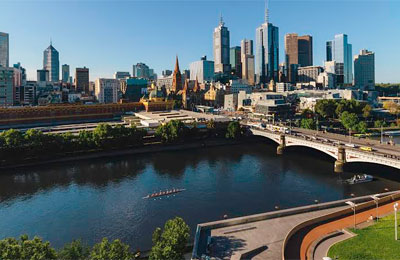
Melbourne landscape
Damascus world’s least liveable city, Melbourne best: study
Dubai, August 19, 2014
Damascus has the worst living conditions among all the cities in the world, said The Economist Intelligence Unit’s latest liveability survey, which ranked Melbourne as the most liveable city for the fourth year in a row.
The liveability score of Damascus in Syria has continued to decline steeply, with the sharpest decline recorded at 7.8 per cent fall over the past 12 months, which led to the city getting ranked bottom of the 140 surveyed, said the report.
Of the poorer-scoring cities, 13 continue to occupy the very bottom tier of liveability, where ratings fall below 50 per cent and most aspects of living are severely restricted. A gradual return to stability has seen improvements in the scores of Tehran, Tripoli and Harare, although all three cities remain firmly entrenched in the bottom tier of liveability.
Tripoli and Tehran have seen the strongest rises in liveability scores of all 140 cities surveyed in the past 12 months, but in the case of Tripoli much of this is offset by stronger declines over the last five years.
Conflict is responsible for many of the lowest scores, The Economist said. This is not only because stability indicators have the highest single scores, but also because factors defining stability spread to have an adverse effect on other categories. For example, conflict will not just cause disruption in its own right, it will also damage infrastructure, overburden hospitals, and undermine the availability of goods, services and recreational activities.
The Middle East, Africa and Asia account for all 13 cities, with violence, whether through crime, civil insurgency, terrorism or war, playing a strong role.
Melbourne, Australia’s fastest-growing city is followed by the Austrian capital, Vienna. Vancouver, which was the most liveable city surveyed until 2011, lies in third place.
For the very top tier of cities, with scores of over 80 per cent, there is no change to report over the past 12 months. Eight of the top ten scoring cities are in Australia and Canada, with population densities of 2.88 and 3.40 people per sq km respectively.
Toronto claims the fourth place, followed by Adelaide, Calgary, Sydney, Helsinki, Perth and Auckland.
With Melbourne set to become Australia’s largest city as early as 2030, the Victorian Government is investing in key infrastructure, from road and rail projects to hospitals and schools, to ensure the state remains the best possible place to live, work and do business.
The Premier of Victoria, Dr Denis Napthine, said: “Our low crime rates, great health system, harmonious multicultural community, excellent education system and road and rail network all played a part in our great city taking out this coveted award again.”
The Victorian state capital offers an unparalleled lifestyle, underpinned by resilient economic credentials, world class infrastructure, excellent health and education systems and progressive business regulation, Dr Napthine added.
John Butler, Victorian Commissioner to the Middle East, Africa and Turkey, said: “Melbourne is Asia-Pacific’s leading destination for cutting-edge innovation, research, development, and high-tech manufacturing, backed by the region’s best talent ecosystem, a pioneering spirit of invention, and unparalleled government support for pro-business regulation and policies.”
“Melbourne has everything a business from the Middle East region needs to succeed in the Asia-Pacific marketplace, and that is why we are seeing more and more companies setting up shop in Melbourne as they expand globally,” added Butler.
The EIU’s Liveability Ranking assesses living conditions in 140 cities across the globe by assigning a rating across five broad categories, including: Stability; Healthcare; Culture and Environment; Education; and Infrastructure. Melbourne scored highly in all of the EIU’s criteria and achieves perfect scores in the areas of healthcare, education and infrastructure. – TradeArabia News Service







